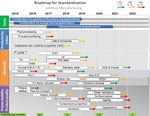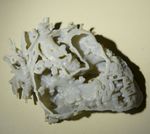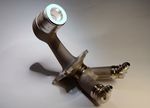The disruptive nature of 3D printing - Digital Transformation Monitor January 2017 - Europa ...
←
→
Page content transcription
If your browser does not render page correctly, please read the page content below
Digital Transformation Monitor
The disruptive nature
of 3D printing
January 2017
Internal Market,
Industry,
Entrepreneurship
and SMEsThe disruptive nature
of 3D printing:
offering new opportunities
for verticals
© Alexander Tolstykh/Shutterstock.com
Significant advances in additive manufacturing (AM) technologies, commonly known as 3D printing, over the past
decade have transformed the ways in which products are designed, developed, manufactured, and distributed. 3D
printing’s ability and advantages over traditional manufacturing open plenty of opportunities for verticals, spanning
from product design and development, customization service, to restructuring of supply chain for higher efficiency.
therefore modification or improvement Cost-effective low volume production
can be made much easier and involving
1 far fewer stages. For this reason 3D
3D printing also reduces the reliance on
economies of scale, since it makes
printing has been vastly used for fast
producing thousands items as cheap as
prototyping and product customization.
Democratisation of Figure 1: 3D printed fuel nozzle by
producing single. 3D printing is thus
viable for low to medium-volume
3D printing is GE production without higher initial
investments for tooling and setup. Not
underway being a replacement solution for the
time being, 3D printing does provide an
Revolution in object creation additional, financially responsible option
for manufacturing.
3D printing (3DP), included in the
broader term of ‘Additive Manufacture’ 3D printing applications
(AM), refers to the various processes 3D printing’s ability and advantages
used in the manufacture of products, by over traditional manufacturing make it a
depositing or fusing materials layer by natural fit for many verticals for various
layer. The 3D-printing process can, Source: GE
purposes, with aerospace, automotive,
though, date back to the 1980s, when medical and many other industrial
Workflow optimisation
additive manufacturing (AM) was products leading the adoption.
practised for rapid prototyping in Workflow and process are expected to be
industrial applications. streamlined, as a result of all the Rapid prototyping still dominates
aforementioned advantages. Additive A PwC survey1 of industrial
Disruptive nature
Manufacture processes are viewed as manufacturers reveals that more than
3D printing holds huge potential to generating less scrap and using fewer two-thirds were already using 3D
disrupt the way in which a product could tools than traditional manufacturing. printing. Most were using it for rapid
be designed, developed and Meanwhile, it is capable of reducing prototyping or experimenting. Other
manufactured. iterative process, assembly and possibly applications include customised
inventory. Consequently substantial production in low volume, and product
Intricate product design
operational cost benefits can be innovation that cannot be achieved using
3D printed parts allows them to be anticipated.
designed with more complex
Figure 2: The adoption of 3D printing regarding different applications
architectures whereas with little
additional costs, for example, the
structure with hollowing, holes, atypical
shapes or rich interior details. In
addition, some pieces that used to be
molded separately and then assembled
can now be produced as one piece in a
single run, even for some precision
components.
Flexibility and customisation
3D printing allows much more flexibility
than standard manufacturing, because
each unit is built independently,
Source: PwC analysis of ZPryme Research survey data, 2015
2The disruptive nature of 3D printing: offering new opportunities for verticals
traditional methods. Using 3DP for final 3D printing in automotive industry 3D printing in healthcare industry
parts production was seen a significant
Automakers have been using AM for over Rapid production of implants and
increase, however, remains marginal,
two decades, and today are progressing prosthetics
mainly due to relatively low throughput
to a variety of applications, ranging from
rate and printing quality. 3DP has been used successfully to make
design, development, tooling and rapid
Demand for diversified usages manufacturing. both standard and customised hearing
aid shell, dental implants and prosthetic
Outside the industries, a survey of Accelerated prototyping
Sculpteo2 shows the full extent of the limbs, sometimes within 24 hours.
Automakers began the use of AM from Previously, implants had to be validated
integration of 3DP in professional
rapid prototyping,. It has been widely before being used clinically, which is
settings. Fast prototype (55%) remains
integrated into the product development very time-consuming. Today, 99% of
the primary application while proof-of-
cycle to speed up this process. It also hearing aids are manufactured with 3DP.
concept (29%) follows its lead.
allows the test-of-concept far less costly
Diversified applications also include Surgical planning and tools
by creating multiple product iterations
hobbies, production, education and
very quickly.
more. Production (24%) is among main Figure 4: 3D printed heart model for
purposes for 3D printing, confirming that Rapid manufacturing of functional parts heart repair surgery
demand is present but requires prior
experience to leverage its full potential. Some functional parts of vehicles can be
printed directly, without moulding and
assembling procedures. The service is
typically applied for high-end cars, for
2 example, sport cars components. In the
long run, a replacement parts may be
“printed” upon request, either by the
automaker or a tier with 3DP services.
Radical BMW 3D-printed water pump wheel for
transformation its German Touring Car Masters racecars
in 2015. BMW states, with 3DP, this high- Source: 3DPrint.com
of verticals precision part is available within only a
few days, and the demand-oriented 3DP has created applications that
A strong uptrend in market growth production becomes more cost-effective. previous technologies are incapable to
achieve - surgical planning and
3D printing industry is growing rapidly. Valued-added service: car customisation
assistance. 3D printed anatomical
The previous three years saw a CAGR 3DP is also being used to produce the models allow surgeons to properly
growth of 33.8%, according to Wohlers personalized car components, such as understand organs’ internal structure.
Report3. The total AM products and car body with different materials and
services worldwide grew at a Compound In addition, surgical guides with a better
forms options, or car accessories.
Annual Growth Rate (CAGR) of 25.9% to visualisation assist surgeons to plan
approximately 4.8 billion EUR in 2015. Customers will benefit from decreased detailed surgical procedures. As a result,
This was the second consecutive year lead times. A Japanese automaker, it increases the clinical efficacy, lowers
that 3D printing industry grew by nearly Daihats allows buyer to order 3D-printed the surgical risk from errors, and
one billion EUR. "skins" to customize the external car produces better outcomes for patients.
body. Daihats indicates, a customised car More than 70,000 surgical guide units
Nearly half of market value4 is that might have taken two months under were produced in 2013 with AM.
contributed by 3DP systems, and this old production methods will be delivered
trend seems to continue in the following 3D bio-printing
in two weeks with the 3D-printed parts.
10 years (estimated 48.1% in 2023). The Looking further, some 3D biomedical
three system manufacturers - Stratasys, However, key spare parts with structural
systems are already capable of printing
3D Systems and EOS, account for nearly or safety properties have not been on the
cells, proteins and organs. Current
70% of the total 3DP systems market. stage of customisations yet.
research interest mainly resides in bio-
printing of skins and organs, including
Figure 3: BMW 3D-printed water the production of bone and cartilage
By 2021, 3D printing scaffolds, ligament and tendon scaffolds.
pump wheel
market is estimated
Although still in its infancy, 3D bio-
to reach
printing offers additional advantages
EUR 9.64 billion 3 over the traditional regenerative
method, particularly in bone and scaffold
regeneration, such as highly precise cell
placement and high digital control of
speed, resolution, cell concentration and
drop volume. Various materials are
available to build the scaffolds,
depending on the desired strength,
Source: BMW porosity and type of tissue.
3The disruptive nature of 3D printing: offering new opportunities for verticals
3D printing in retail and consumer 3D printing in manufacturing Reshaping of regional manufacturing
products competitiveness
Disrupting the value chain
Product and service innovation In the future, 3D printing may impact the
Apart from the specific impact to
3D printing is being explored to design, particular verticals, 3DP also has locations of plants. Given the ability to
develop and manufacture a variety of influence across the value chain of create highly customized products with
consumer products, spanning from manufacturing. New business is fewer overheads and production steps,
clothes, jewellery and other fashion emerging along with service platforms. many companies perceive 3D printing as
products, digital accessories, to home an opportunity to re-shore
• Marketplace of 3D print files manufacturing back to Western
gadgets and decoration.
The marketplace came into being, since countries.
To begin with, 3DP is capable of creating
the file creation is a process where a Different regions are highly expecting
intricate design or geometric free
strong design expertise is needed. In the shift of plants location as well.
structure. In addition, 3D printing opens
such marketplaces, designers upload According to a survey conducted by EY
a door to offer mass customization at
files of required formats while users can Research5, UK leads the expectation with
lower cost. On this basis, collective-
download the files for free or pay some 66% anticipating this change, followed
design will become a reality since the
fees for later printing. by China and South Korea (46%), as well
exchange and coordination between
designers and buyers cost much less • On-demand 3D printing service as Germany (43%). For the US (37%)
than before. platform or hub and the rest of Western Europe (35%).
Decentralised manufacturing of products It can be brick-and-mortar locations or
3
online services, where both individual
Additive manufacturing enables
and industrial customers can
decentralized manufacturing of
“outsource” the 3D printing service to
consumer goods. Multiple assembly
processes and long-distance
transportation will be eliminated. A
desired manufacturers, and have the
goods delivered at their desired location. Taking steps
number of benefits can be expected:
costs and time saving, improved
Both platforms are fueling decentralized
manufacturing, and impact the value
forward
responsiveness and flexibility, chain on many aspects. For one thing, Price drop as a booster for adoption of
management of demand uncertainty and competitiveness will increase with the 3D printing
reduction in required inventory. costs going down. For another,
production bases are no more necessary A huge drop in price has been playing
As a result, the logistics costs will be out since 2014, particularly for desktop-
since it can be outsourced to scattered
significantly reduces for manufacturers. sized 3D printers, due to the expiration
local 3DP hubs, and only crucial value-
Meanwhile, logistics companies are of key patents that year. A previous
added processes should be insourced.
looking for new value-added services for patent expiration in 2009 led to a
Flexible tariff for on-demand services
their manufacturer clients. UPS is significant drop of printer prices from
will be another benefit, compared to
reshaping its logistics business - turning EUR 13,000 to approximately EUR 275-
standard manufacturing.
its airport hub warehouses into mini- 375 during the past 5 years. The trend is
factories by using 3D printing This area becomes crowed while expected to continue, allowing consumer
technology. This is a forerunner to a time retailers, 3DP system providers as well to choose between higher speeds and
when distribution companies themselves as internet providers are stepping in. more materials options (metal, ceramic).
become factories. Shapeways, Thingiverse, Staples, 3D
Hub, Sculpteo, UPS and Amazon are Meanwhile, the proliferation of start-ups
among the active players. resulted from the patent expiration may
bring more innovation to sweep out
technical hurdles for adoption. The
MakerBot Replicator 2X, for example,
43% of companies expect controlled by simplified 3D software, is
3D printing to have a
priced at EUR 2,300 but is as reliable and
strong impact on the
as good as the Stratasys uPrint which
location of plants.5
sells for EUR 15,000.
© Alexander Kirch/Shutterstock.com
Figure 6: Value chain of manufacturing enabled by 3D printing
Source: IDATE DigiWorld, 3D Printing, 2015
4The disruptive nature of 3D printing: offering new opportunities for verticals
Standardisation in additive Figure 7 : Roadmap for standardisation of Additive Standardisation
manufacturing
The lack of European and international
standards related to AM will be a
nimpediment to the implementation on a
large scale. Facing this challenge, EU
project for Support Action for
Standardisation in Additive
Manufacturing (SASAM) delivered a
roadmap for standardisation activities
for AM in 2013.
A number of standards categories were
distinguished including design, specific
industrial needs, quality of manufactured
parts, materials, data processing, safety
(regulations) and education. This
dedicated standardisation roadmap is
expected to release an economical push
towards the reliability of the processes,
printers and their products.
DRM to protect intellectual properties Source: SASAM
The rising of marketplaces of design Further, the repeatability of production Lack of expertise
files, where people can download is an uncertain element. Many printed
printing contents for free, imposes an parts also need traditional finishing is a User and consumer unfamiliarity with
increasing threat to intellectual factor which limits any gains in 3DP is eroding somewhat their interest
properties (IP). Garner6 reported that by production flexibility and lead time. in acquiring both 3DP systems and
2018, 3D printing will result in the loss printing services. A survey by EY6
of at least 100 billion USD per year in Trade-off between printing speed and implies that, even product engineer
intellectual property rights globally. quality admits that they do not have enough in-
house expertise to establish the
Following the same development Speed, often a result of printing
processes driven by 3D printing. In this
trajectory as other digital content like resolution and magnitude, is a factor that
sense, education and learning to cover a
music and films, the companies that significantly impact the 3DP adoption.
processes driven by 3D printing. In this
provide DRM systems to secure and rule The usage of 3DP for direct manufacture
sense, education and learning to cover a
the digital files access, delivery and is moving slowly; because the low speed
wider range of the population is more
printing process are emerging in an (hours’ printing for several inches) does
than necessary to drive up the adoption.
iTunes-like mode. Authentise and not have any advantage over traditional
SendShapes are at the forefront in mass manufacturing. We do see some
printer speeds are increasing, but mainly
providing DRM solutions to design
model owners and marketplaces. appeared in high-end industrial or References
enterprise systems.
Roadblocks to move away
1 PwC analysis of ZPryme Research survey data,
Legal barriers 2015, 2015 Disruptive Manufacturing Innovations,
Quality of the printed products Available at:
For decades that 3D printing has existed, https://3dprintingindustry.com/news/new-pwc-
Surface finish and mechanical properties study-showcases-manufacturing-trends-3d-printing-
however, jurisprudence remains unclear technology-76826/
are of great concern, particularly for the concerning many legal regimes including ² Sculpteo, 2016, State of 3D Printing, Available at:
usage in final or functional parts patents, copyrights and trademark. Apart https://www.sculpteo.com/static/0.30.0-
manufacturing. For instance, those from this, public security are challenged 116/download/report/Sculpteo_State_of_3D_Printin
technologies working with metal g_2016.pdf
given the fact that advancement of 3DP
powder, are often associated with ³ Wohlers, 2016, Wohlers Report 2016, Available at:
may facilitate the manufacturing of http://wohlersassociates.com/2016report.htm
property problems, such as strength, illegal objects, such as firearms. 4 SmarTech, 2014, 3D Printing 2014: A Survey of
stress and voids resulting from heating SmarTech’s Annual Market, Available at:
and layer binding. http://smartechpublishing.com/reports/3d-
printing-2014-a-survey-of-smartechs-annual-
market-findings
Figure 8 : Reasons for no 3DP experience 5 EY Research, 2016, Global 3D printing Report: 3DP
Industry, Available at:
http://www.ey.com/de/de/services/advisory/perfo
rmance-improvement/supply-chain/ey-global-3d-
printing-report-2016-3dp-industry
6 Gartner, 2014, Gartner Says Uses of 3D Printing
Will Ignite Major Debate on Ethics and Regulation,
Available at:
http://www.gartner.com/newsroom/id/2658315
Source: EY Research, 2016
5About the Digital Transformation Monitor The Digital Transformation Monitor aims to foster the knowledge base on the state of play and evolution of digital transformation in Europe. The site provides a monitoring mechanism to examine key trends in digital transformation. It offers a unique insight into statistics and initiatives to support digital transformation, as well as reports on key industrial and technological opportunities, challenges and policy initiatives related to digital transformation. Web page: https://ec.europa.eu/growth/tools-databases/dem/ This report was prepared for the European Commission, Directorate-General Internal Market, Industry, Entrepreneurship and SMEs; Directorate F: Innovation and Advanced Manufacturing; Unit F/3 KETs, Digital Manufacturing and Interoperability by the consortium composed of PwC, CARSA, IDATE and ESN, under the contract Digital Entrepreneurship Monitor (EASME/COSME/2014/004) Authors: Vincent Bonneau & Hao Yi, IDATE; Laurent Probst, Bertrand Pedersen & Olivia-Kelly Lonkeu, PwC DISCLAIMER – The information and views set out in this publication are those of the author(s) and should not be considered as the official opinions or statements of the European Commission. The Commission does not guarantee the accuracy of the data included in this publication. Neither the Commission nor any person acting on the Commission’s behalf may be held responsible for the use which might be made of the information contained in this publication. © 2017 – European Union. All rights reserved.
You can also read



























































